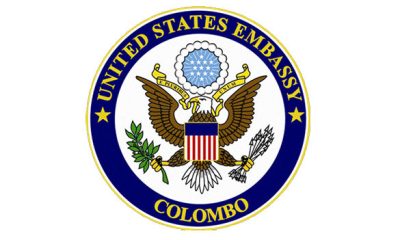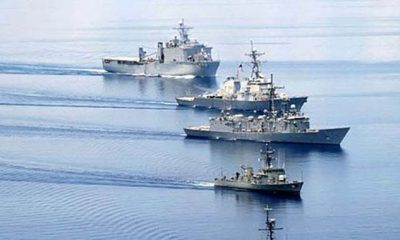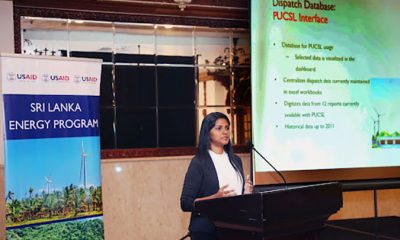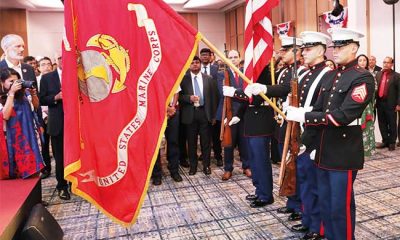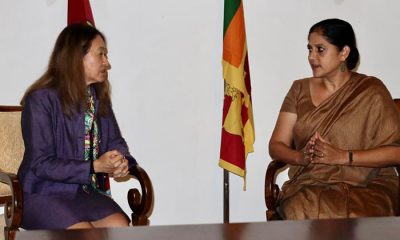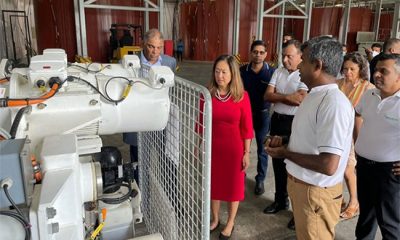News
US National Security, foremost factor in ‘Export Control & Border Security’ project in Sri Lanka: ex-State Dept employee

Retired Foreign Service National Political Specialist of the U.S. Department of State Daya Gamage who was in the Political Division of the US Embassy in Sri Lanka has said that the US was stepping up an operation here meant to enhance its own security.
American ambassador Julie Chung announced recently the arrival of an official to join her diplomatic staff, in the wordings of a twitter message from the ambassador “Welcome a new team member from US Export Control and Border Security (EXBS) to work with the GoSL to develop and enhance systems for safe, productive ports, ensuring SL can strengthen trade and exports to build the economy in this challenging period.”
The announcement largely went unnoticed as it would have been considered another Washington assistance to lift Sri Lanka’s economy from its current doldrums, he said.
In what manner could Washington endeavor to help “for safe, productive ports, ensuring SL can strengthen trade and exports,” never came to anyone’s mind, Gamage added.
Gamage issued the following statement: “On the face of the announcement Washington intentions were to “strengthen trade and exports to build the economy in this challenging period” which is an immediate need of Sri Lanka, but the background check revealed the foremost objective was indeed to strengthen and enhance the national security of the United States which was its prime focus since 2016 with the undertaking of building military capabilities and economic power in the Indo-Pacific region to lessen the clout of China. What happened here, with the arrival of the official from Washington, is that the United States Government stepped into Sri Lanka, which is strategically located at the center of the Indo-Pacific region to do just that.
The US is already has three defense and technology agreements with India.
It is interesting to find out the covert motives behind the declared intention to assist Sri Lanka, and how Washington could ‘bind’ Sri Lanka to assist its foremost objective in further strengthening its national security at a time when there is an imminent threat from China in the Indo-Pacific region.
Despite the Rajapaksa-controlled political entity continues to hold a clout in the legislature with its national and global credibility at a low ebb, it has collaborated with its presidential nominee Ranil Wickremasinghe for the latter to have a free hand in the governance knowing full well that he has better inroads to Western portals of power centers to seek economic assistance. The US has 16.6% control over the IMF and a greater clout in the World Bank.
Of course, Ranil Wickremasinghe as prime minister during 2002-2004 period – under Chandrika Kumaratunga’s disabled presidency – due to her political coalition losing control of the legislature in December 2001 elections followed by the surrender of the vital foreign and defense establishments to the prime minister of her rival party – signed two military agreement with the U.S. to facilitate to protect (from the International Criminal Court) alleged American war criminals engaged in Iraq and Afghanistan, and extend the facilities of the Colombo Airport to have easy transfer of alleged 9/11` terrorists in American custody to CIA torture chambers in other countries. India refused to sign both these agreements, vehemently opposing them. Washington progressively increased economic assistance during Wickremasinghe tenure due to the then Deputy Secretary of State Richard Armitage’s direct involvement in GSL-LTTE peace talks. The Norwegian negotiator Erik Solaheim, who was found favoring the LTTE at that time arrived in Colombo last week as an advisor on environment to President Ranil Wickremasinghe.
Could be Washington’s reading was correct – well fed by Julie Chung’s diplomatic post in Colombo – that President Ranil Wickremasinghe could facilitate to achieve what is intended by sending an official to fulfill the ‘national security’ tasks embedded in four U.S. federal regulations: (1) U.S. Export Control and Border Security (2) Export Control Reform Act (3) Export Administration Regulations and, (4) Bureau of Industry and Security.
The new arrival from Washington’s Export Control and Border Security is attached to the US Commerce Department under which the four US Federal regulations are strictly enforced through overseas diplomatic missions of the US Department of State under which Ambassador Julie Chung functions.
As Ambassador Chung herself in a twitter notification – announcing the new arrival from Washington – mentioned the use of US Export Control and Border Security to strengthen Sri Lanka’s trade and export, it is pertinent to find out what the US Export Control Policy is:
With the stated policy to preserve the qualitative military superiority of the U.S. and to strengthen the U.S. defense industrial base, Washington will use export controls considering the impact of its economy to restrict the export of items which would make a significant contribution to the military potential of any other country while strengthening U.S. defense industrial base.
On May 16, 2019 the China-based Huawei Technologies operating in Sri Lanka was black listed by the Government of the United States. This is one of the world’s largest providers of telecommunications equipment, networking gear, smart phones and more.
The U.S. Department of Justice (DOJ) on January 28, 2019, charged Huawei with bank fraud and stealing trade secrets. Huawei denied the U.S. charges, saying requests to meet with the US Justice Department had been “rejected without explanation.” The company said that the trade secret theft allegations were “already the subject of a civil suit that was settled by the parties.”
The targeted goals of the US Export Control Policy were, to carry out the foreign policy of the United States, including the protection of human rights and the promotion of democracy, to ensure national security controls are tailored to focus on those core technologies and other items that are capable of being used to pose a serious national security threat to the United States, to ensure national security controls are tailored to focus on those core technologies and other items that are capable of being used to pose a serious national security threat to the United States. One other objective is the national security of the United States requires that the United States maintain its leadership in the science, technology, engineering, and manufacturing sectors, including foundational technology that is essential to innovation. Such leadership requires that United States persons are competitive in global markets. The last objective explains why Washington black listed Huawei Technologies operating in many countries including Sri Lanka.
The Export Control Policy document has clearly stated that the “US needs to do the hard internal work of deciding which specific commodities, software, and technologies should, for example, be controlled to (i) respond to human rights abuses; (ii) support a “global level playing field;” (iii) address “legal, ethical, and political concerns” about emerging technologies; (iv) respond to civil-military fusion policies in countries of concern; (v) avoid disruptions to strategic supply chains; and (vi) respond to “technology acquisition strategies, including economic coercive measures.” The primary agencies responsible for such work are the export control agencies at the departments of Commerce, Defense, State, and Energy.”
It is within these parameters that the Government of the United States will engage in discourses with the Government of Sri Lanka, and an experienced official from the US Department of Commerce, just arrived at the American Embassy, to fulfill Washington’s desire to hold onto its hegemony in the Indo-Pacific region.
What is understood and seen from outside is “to work with the GoSL to develop and enhance systems for safe, productive ports, ensuring SL can strengthen trade and exports to build the economy in this challenging period.”
News
NPP: Speaker won’t step down, CIABOC can investigate him
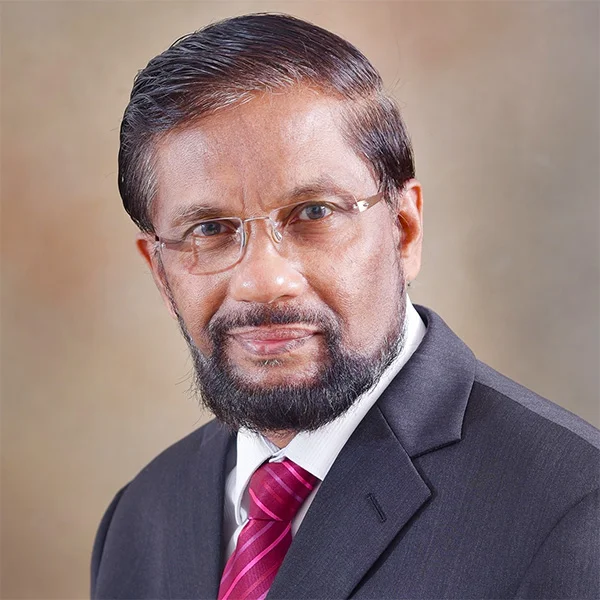
* New Auditor General should not have been sworn in before Speaker – Opp.
* Suspended House Dy. Sec. Gen. Chaminda Kularatne takes his case to CA today
General Secretary of the National People’s Power (NPP) Dr. Nihal Abeysinghe yesterday said that there was no need for Speaker Dr. Jagath Wickramaratne to step down in view of the complaint lodged against him with the CIABOC (Commission to Investigate Allegations of Bribery or Corruption).
NPP General Secretary said so in response to The Island query whether the parliamentary group of the ruling party discussed the growing Opposition calls for the Speaker, who is also the Chairman of the Constitutional Council, to step down to facilitate the investigation.
The NPP parliamentary group consists of 159 MPs, including 18 National List (NL) members.
NL member Dr. Abeysinghe asked whether any other person, who had been investigated by the CIABOC, stepped down from his or her position to facilitate the inquiry.
The top official emphasised that the CIABOC could go ahead with its investigation without any hindrance.

Chamindra and Dr. Jagath
Opposition sources said that there hadn’t been a similar situation before and the CIABOC investigation into Speaker Dr. Wickramaratne is unprecedented as he heads the 10-member CC responsible and directly involved in all key appointments, including that of members to the CIABOC.
Sources pointed out that the newly appointed Auditor General, Ms. Samudrika Jayaratne, took the oath of secrecy before the Speaker on 5 February in Parliament after suspended Deputy General Secretary of Parliament Chaminda Kularatne complained to CIABOC.
In accordance with Section 9 of the National Audit Act, No. 19 of 2018, Jayaratne took the oath of secrecy in her capacity as the Auditor General of the National Audit Office and Chairperson of the Audit Service Commission.
Sources said that Kularatne would move the Court of Appeal today (10) against his removal at the behest of the Staff Advisory Committee, headed by the Speaker.
By Shamindra Ferdinando
News
Trinco Buddha statue case: All suspects, including 4 monks re-remanded till 11 Feb.

The Trincomalee Magistrate’s Court yesterday (09) further remanded 10 persons, including four Buddhist monks, arrested on 19 January, 2026, for allegedly placing a Buddha statue in the coastal reservation, on 16 January.
The Buddhist monks, including Ven. Balangoda Kassapa Thera, and six other individuals, were further remanded until 11 February.
They have been accused of violating the Coast Conservation Act by placing a Buddha statue on a block of land belonging to the Trincomalee Bodhiraja Temple.
Of the four monks, Ven Balangoda Kassapa Thera and Ven Trincomalee Kalyanawansa Tissa Thera moved the Court of Appeal against the Magistrate’s Court decision. The case was heard on 22 January before a Bench comprising the President of the Court of Appeal, Justice Rohantha Abeysuriya, and Justice K. Priyantha Fernando.
Manohara de Silva, PC, and President’s Counsel Uditha Igalahewa, PC, appearing for the petitioners, urged the Court to take up the matter urgently, describing it as a case of exceptional importance.
However, the Court of Appeal on 3 February dismissed the petitions against the remanding of Ven Balangoda Kassapa Thera and Ven Trincomalee Kalyanawansa Tissa Thera.
The order was issued by the Court of Appeal bench consisting of the President of the Court of Appeal, Justice Rohantha Abesuriya and Justice Priyantha Fernando.
News
Pakistan HC commemorates Kashmir Solidarity Day
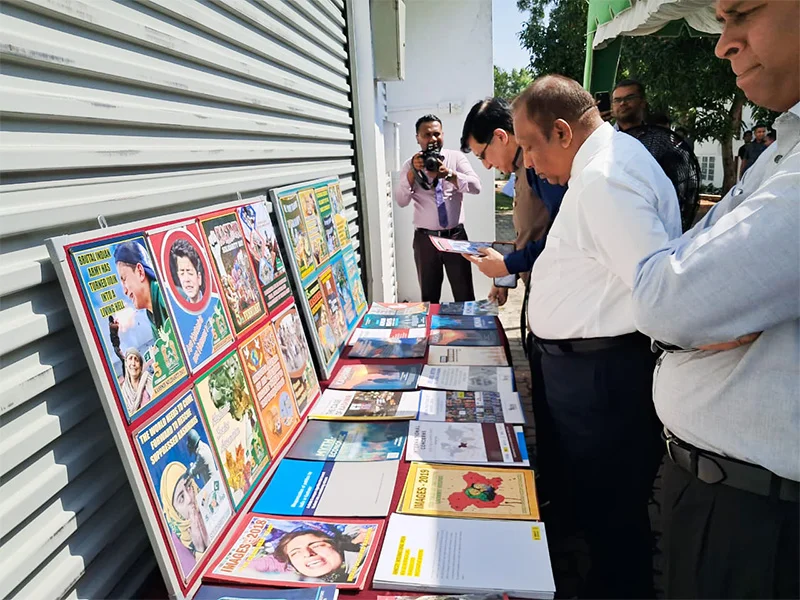
The Pakistan High Commission in Colombo recently organised a seminar and photo exhibition at the HC premises to commemorate Kashmir Solidarity Day. The following is the text of the statement issued by the PHC: “The event highlighted Pakistan’s continued support for the Kashmiri people and emphasised the importance of a peaceful and just resolution of the Jammu and Kashmir dispute. Members of the Pakistani community, friends of Kashmir, and local journalists attended the event.
The seminar concluded with remarks by the High Commissioner of the Islamic Republic of Pakistan, Major General (R) Faheem-ul-Aziz, HI (M). He reaffirmed Pakistan’s principled stance on the Jammu & Kashmir issue and underscored the need for sustained international engagement. He noted that the situation in Indian Illegally Occupied Jammu & Kashmir (IIOJK) has remained a matter of concern for decades and called upon the international community, particularly the United Nations, to play its role in promoting peace, stability, and respect for human rights.
The High Commissioner emphasised that the Jammu and Kashmir dispute should be resolved in accordance with international law and relevant UN Security Council resolutions, cautioning that prolonged tensions could have broader implications for regional peace and security.
The event featured keynote addresses by Shiraz Yunus and Ms. Suriya Rizvi, who highlighted the importance of dialogue, interfaith harmony, and peaceful coexistence. They also drew attention to humanitarian concerns and stressed the need for safeguarding fundamental rights in the region.
Earlier, messages from the President and the Prime Minister of Pakistan, issued on the occasion of Kashmir Solidarity Day, were read out by the Press Attaché and the Trade & Investment Attaché, respectively.
As part of the Photo Exhibition, photographs and digital presentations, depicting the humanitarian situation in IIOJK, were displayed during the seminar.”
-

 Features2 days ago
Features2 days agoMy experience in turning around the Merchant Bank of Sri Lanka (MBSL) – Episode 3
-

 Business3 days ago
Business3 days agoZone24x7 enters 2026 with strong momentum, reinforcing its role as an enterprise AI and automation partner
-

 Business2 days ago
Business2 days agoRemotely conducted Business Forum in Paris attracts reputed French companies
-

 Business2 days ago
Business2 days agoFour runs, a thousand dreams: How a small-town school bowled its way into the record books
-

 Business2 days ago
Business2 days agoComBank and Hayleys Mobility redefine sustainable mobility with flexible leasing solutions
-

 Business3 days ago
Business3 days agoHNB recognized among Top 10 Best Employers of 2025 at the EFC National Best Employer Awards
-

 Business3 days ago
Business3 days agoGREAT 2025–2030: Sri Lanka’s Green ambition meets a grid reality check
-

 Editorial5 days ago
Editorial5 days agoAll’s not well that ends well?


